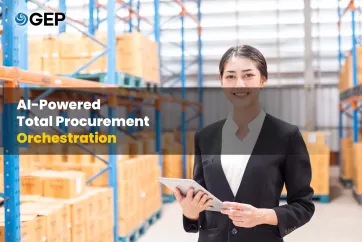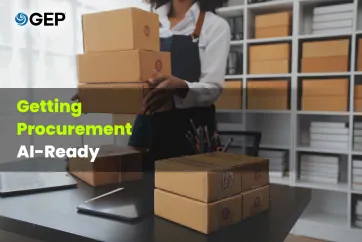
How Will AI Transform Operations for Procurement Professionals?
March 17, 2020 | Procurement Software 6 minutes read
It’s another Monday at the office and you have been running through your to-dos for the day in your head all morning. Just as you get settled at your desk, your boss emerges with a request. She is asking for numbers on the total spend with your top services provider “and any other relevant info of use,” she to present at the board meeting this afternoon.
You consider your quickest path to gain access to the datasets you need. Whether you choose to consult a data analyst or someone in IT, it will surely be time-consuming and difficult to coordinate.
Let’s be honest. You’re likely to have to tell your boss that there’s no way you’d be able to have that information by the afternoon.
After sending several emails and making your rounds of the office, you have finally compiled your data sets. Five days have gone by. And now begins the tedious process of extracting meaning from the data to create a reliable and accurate report.
Now envision this: Upon receiving the request from your boss, you quickly log in to your procurement platform and type, “What percent of total spend is with our top services provider?” The answer appears in the response box, even including comparative data of the total spend of your next four top four providers.
Then, it’s on to gathering “any other relevant info to use,” to fulfill the other part of your boss’s query.
This time instead of typing, you click on the microphone icon in the platform and ask it this question: “Can you provide me with some insights on our relationship with this supplier?” speaking your question naturally to the system just as you would to a coworker. Within seconds, a rich dashboard-like report is processed and ready for your review. A complex task has become dramatically optimized and easier to carry out.
And this is just another day for you in the new, normal life as a procurement professional.
When key procurement operations are simplified, you and your team aren’t caught up in tactical processes like chasing metrics and analytics — you can focus on the bigger picture. The implementation of AI in procurement operations poses tremendous value in procurement, accelerating productivity and efficiencies.
It is procurement made more intelligent. How is this possible? Through artificial intelligence. This is the future, yes — but that future may be closer than you think.
Transformation in a Digital-First World
In a business landscape that is increasingly volatile, companies must learn to cope, adapt and adjust to maintain agility and competitive advantage. Digitalization has inspired a new era of procurement, allowing source-to-pay processes to be optimized. So how can companies effectively navigate an ever-changing business environment and get the most out of their procurement operations?
AI holds the key. AI picks up the slack from humans, sorting out the messiness of manual, effort-intensive work, adding value to the complex work needed to keep the focus on strategic cost management and supplier relationship management. AI is an important force-multiplying vehicle that can elevate procurement’s business value beyond today’s expectations.
It offers the potential to positively disrupt the critical business functions of procurement and in the supply chain altogether.
What Benefits Does AI Bring to Procurement?
AI offers exceptional benefits in procurement. The use of natural language processing, machine learning, predictive analytics, forecasting, and robotic process automation will escalate operational efficiency and foster more strategic decision-making. These powerful technologies drive three transformative outcomes:
1) Improved Quality and Visibility of Data
Without a clear, streamlined and transparent view of data, the enterprise is unable to generate significant insights and decisions to drive growth and savings. Human error and disparate systems that are not connected to each other often muddy up data, making it difficult to compile as well as trust its accuracy and reliability. In addition, data needs to be organized into a common and consistent framework in which all users across the enterprise can readily and easily access, understand and analyze it for decision-making.
Traditionally, procurement and technology professionals would need to perform many mundane and repetitive procedural tasks, as well as complex data integration to cleanse and normalize data — and be able to reliably use it. But an AI-based digital procurement platform changes this.
With the ability to self-cleanse, deduplicate, classify and aggregate data, an AI-based digital platform increases visibility into data, enabling enterprises to obtain a better handle on procurement from spend behaviors to performance of suppliers. And with enhanced visibility comes a host of other benefits and value, boosting accuracy, including improved accuracy and decision-making and better user compliance and adoption.
2) Improved Operational Efficiency and Efficacy
The most notable advantage of AI is its capacity to impact operational efficiency. Without an AI-enabled platform to help speed up operations, it is up to procurement professionals to perform time-consuming tasks that require many different people and departments, and mental capacity. AI can handle many tactical processes within procurement, and it can also help generate insightful and actionable information. This in turn frees up procurement professionals to focus on strategic operations and decision-making.
Robotic Process Automation (RPA) is a simple form of AI technology that utilizes rule-based algorithms to fulfill queries. Greatly speeding up processes and operations on its own, RPA enhanced by AI and emerging technologies would have transformative impact, not only boosting operational efficiency, but also facilitating more intelligent, strategic and effective operations overall. For instance, in the area of contract negotiation and performance, RPA combined with AI would use computer protocols to digitally facilitate, analyze and implement the automatic negotiation and performance of contracts with suppliers.
“Smart clauses” would measure the contract against contract criteria to monitor and track supplier performance. The combination of RPA boosted by AI makes the entire source-to-pay process more seamless, while reducing erroneous or duplicate orders and preventing overpayments or underpayments. This helps drive growth to the bottom line.
3) Enhanced Insights and Decision-Making
One of the most exciting aspects of AI is its ability to foresee problems and scenarios that could happen and give you the answers to business questions you might not have thought of yet. This predictive capability will continuously offer pleasant and insightful surprises.
Digital platforms that utilize machine learning can predict patterns and trends in behaviors to make suggestions, learn and revise, improving their responses over time. Through assessment of current and upcoming trends and changes, AI has the proactive ability to sense, infer and predict. This poses an invaluable benefit to procurement professionals helping generate new insights, discover new opportunities and direct them on the right trajectory in response to these changes and trends.
An advanced AI-intelligence like predictive analytics offers great value to many applications in procurement. In supplier management, for example, predictive analytics can help alert procurement professionals when a supplier is deviating from a contract or poses potential risk before the contract is created at all. Predictive analytics can also help procurement professionals decide which sourcing opportunities to pursue and when — such as, buying now vs six months from now.
AI’s capability to learn sourcing behaviors and preferences will help procurement professionals rapidly connect with the best suppliers for their company, as well as identify their company’s best opportunities for the highest savings.
Powering Up Procurement Processes
An AI-enabled procurement platform is a competitive advantage — it is an invaluable tool that will power up processes and drive serious value.
With its game-changing impact, AI is the ultimate assistant for a procurement professional.
And it all begins with the day-to-day operations of the procurement professional, making tasks and processes faster, easier and more effective — one spend analysis report at a time.



